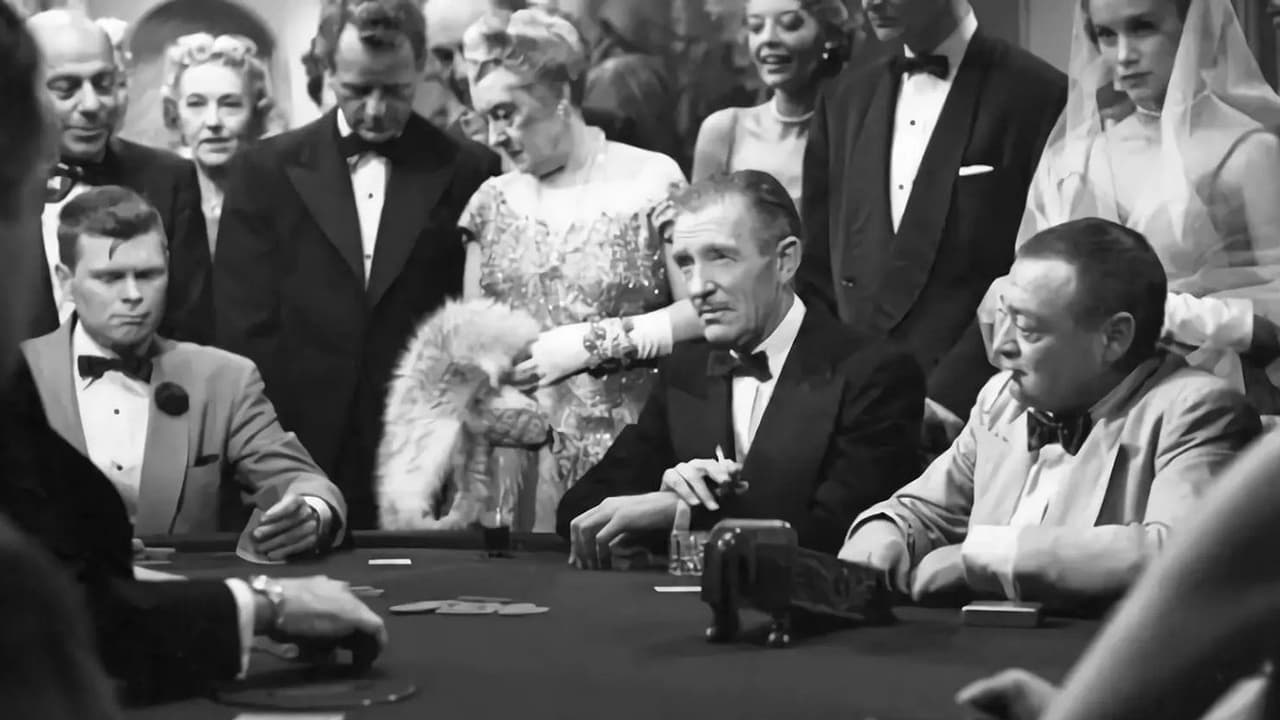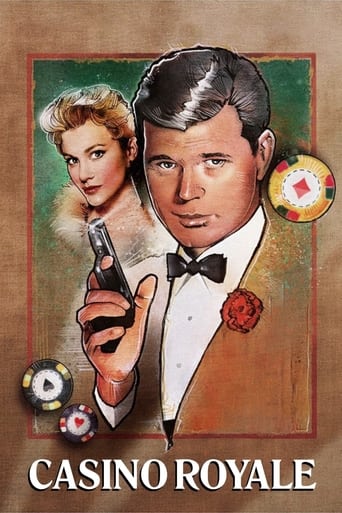Linbeymusol
Wonderful character development!
Matialth
Good concept, poorly executed.
Bergorks
If you like to be scared, if you like to laugh, and if you like to learn a thing or two at the movies, this absolutely cannot be missed.
Matthew Kresal
If you thought that the first screen Bond outing was Dr. No and that Sean Conery was the first Bond, you'd be wrong. Coming the better part of a decade before Dr. No was made and Goldfinger firmly established the image of Bond in the public consciousness, Bond came first to American television screens. For one hour in October 1954, Ian Fleming's first Bond novel was broadcast live on CBS. Despite the films that followed, it remains interesting viewing.Despite being merely an hour in length, the script Anthony Ellis and Charles Bennett is a surprisingly faithful adaptation of the original novel. The central plot of the novel, of Bond going to a French casino to bankrupt Le Chiffre at the baccarat tables and thus ensure his death at the hands of his Soviet paymasters, is front and center here. Much of the incidental events from the novel are in this version as well including one of Le Chiffre's henchmen threatening Bond with a gun hidden in a cane during the game. Even when incidents from the novel are difficult to do on screen to network censors and the limitations of live television production, versions of them still appear. These include an attack on Bond while entering the casino and even a version of Bond being tortured after the game in present though both mean that it's less gruesome than what both the novel and the 2006 EON film presented us with though it certainly seems to be no less painful for Bond. In a way the adaptation here is more faithful to its source material than many of EON's subsequent adaptations of Fleming's novels.Where it is less faithful is in its casting. Perhaps the most notable change, and the one most likely to hanker fans of both the novels and the later films, was the decision to make Bond an American in a move that seems to have been made to pander to the American audience who would hopefully tune in. Actor Barry Nelson (who is perhaps better known for his role as the hotel manager who interviews Jack Nicholson's character in the opening of Stanley Kubrick's The Shining) was cast in the role of "Card Sense Jimmy" Bond who was an agent of a fictional spy agency called Combined Intelligence. Nelson's Bond reflects little of the character that Fleming wrote in the original novel with his squared jaw and lack of charm which at times seems more in the vain of the gumshoe characters out of countless film noir works from the period. Yet Nelson is also able at times to show a more vulnerable character, especially in the torture sequence, which the EON films wouldn't bring out until Dalton and Craig took on the role decades later. It's a credible attempt at bringing Bond to life but it's also one that shows just how crucial the casting of that lead role can be.Other members of the cast work better. The characters of Vesper Lynd and Bond's French ally Rene Mathis are combined into a single character named Valerie Mathis played by Linda Christian. Christian does an admirable job bringing the first Bond Girl to life as a character though the adaptation not only combines the characters together but also gives them a past relationship that echoes Humphrey Bogart and Ingrid Bergman in Casablanca made a dozen years before. Another departure from the novel, and an interesting reversal of what was done with the Bond character, is the casting of the Australian actor Michael Pate in the role of British agent Clarence Leiter who takes the place of CIA agent Felix Leiter. Pate does an admirable job though the friendship between this particular Leiter and Bond seems a bit forced, especially in the opening minutes of the production. Like Nelson's Bond, the performances are credible but they're also far more admirable attempts as well.The most notable member of the 1954 Casino Royale cast though would be its villain. Playing Le Chiffre is none other than Peter Lorre, an iconic character actor notable for films including 1931's M and 1941's The Maltese Falcon. Lorre was perfect casting for the role and he brings a wonderful sense of menace mixed with charm to the first Bond villain, something that's especially present during the interactions between Bond and Le Chiffre during the first part of the production. Where Lorre really shines is during the last act when he taunts Bond as he's being tortured, mixing the charm and menace together in equal measure. If anything from this 1954 production pre-echoes what EON would do later, it's Lorre's Le Chiffre and that isn't a bad thing at all.For Bond fans, the 1954 Casino Royale makes for interesting viewing. Coming nearly a decade before the Eon films that have now firmly rooted the character for most people, it is a fascinating look at bringing Bond to the screen. Even with its faults and limitations of the format in which it was made, it remains at least a curiosity and at best something that die-hard fans of Her Majesty's secret servant should view at least once.
Zbigniew_Krycsiwiki
Early TV movie adaptation of 'Casino Royale' has the low key feeling of the original novel. The low budget both helps the movie and hinders it: it gives it the grittier look that some of the Bond novels have, and also makes it look slightly like a film noir, but also limits it in term of sets and props and lighting (which is often times visible over the actors' heads.) The short run time is also a mixed bag: the film doesn't overstay its welcome, and follows the book fairly closely, (the original novel was so short that it seems almost like a pamphlet, rather than a full length novel) but it doesn't give much opportunity to flesh out the characters at all.Peter Lorre is good as LeChiffre, and Michael Pate as Leiter (or "Letter" as he's listed in the end credits) is very likable, and perhaps would have made a better choice to play Bond here, but Barry Nelson was mediocre. If he would have been more familiar with the character and not been doing a Humphrey Bogart impersonation, he might have been good. He does fairly well when he's intensely grilling Valerie Mathis about the microphone LeChiffre planted in Bond's room, and he's adequate in the casino sequences, but falls flat during the climactic scenes.This TV-movie is also marred by the fact that the love interest between Bond and the lead girl is almost completely overlooked here, as is Bond's contemplation of resignation and his subsequent double-cross by the girl; basically the entire fourth(!) act of the novel was omitted here. Maybe if it would have had a longer running time, and if the censors would have allowed it, they could have fleshed out some of these omitted story elements? One of the villain's henchmen has a cane which doubles as a gun, which is a good touch; this particular scene follows the book closely, and is one of the better scenes in this film.
winner55
A lot has to be forgiven here. First, this is a recording of a live performance - when something went wrong, they were stuck with it; and since this is cheaply made, they had little rehearsal time, so a quite a number of things go wrong. Secondly, the surviving recording is incomplete and not very good. Third, the producers of the show were trying to make the British Ian Fleming's break-out novel accessible to American audiences only familiar with American espionage B-movies, a '50s genre that has not gotten preserved, so most people now will not be familiar with the drab back-alley feel of this show drawn from that genre. And that the producers felt the need to go this route shows that they themselves really had little understanding of where Fleming was coming from - which was really Somerset Maugham's "Ashenden, or the British Agent," filmed in the early '30s by Alfred Hitchcock. And really, prime Hitchcock is the director Fleming would have had in mind while writing this book. But despite his popularity, Hitchcock himself remained an anomaly in Hollywood throughout the '50s. His ability to shock audiences was well known, but his capacity for sophisticated wit and subtle irony were not easy for most Americans to grasp at the time.So too Fleming's subversive sense of what at last became known as the "anti-hero" - a man as ruthless as his enemies, able to seduce and destroy women with a glance, then quietly order breakfast in a luxury hotel as if nothing happened. For Fleming, this was a means of preserving the "hard-boiled" detective tradition while at the same time raising uncomfortable questions about what it meant to live comfortably middle-class in cold-war England. Never pointed enough to threaten middle-class readers, but enough to raise their anxiety level to the point of continued interest in the James Bond series.There's none of that here - the romance is played straight, and the only sophistication comes in the gambling scene. The rest bulls through or stumbles along as one might expect from an American genre thriller of the time.The major plus factors here are the performances. Most of the cast is miscast, but performs energetically despite that; Peter Lorre performs very weakly, but he happens to be perfectly cast - he is the definitive Le Chiffre! That surprising discovery is reason enough to find this show and give it a view, at least for Bond aficionados.
Jon Washbrook
This film is a bit of an oddity. It was a live TV play, made a decade before Sean Connery appeared in Dr No. It's nothing like the Bond films we all know and love - anyone expecting action set-pieces will be disappointed as the whole play/film takes place on 2 sets.THE GOOD POINTS: 1. A rare little gem, bringing James Bond to the screen for the first time. 2. One of the closest adaptations of Ian Fleming's works. 3. Peter Lorre - very good villain.THE BAD POINTS: 1. Renaming James Bond as "Card-Sense Jimmy Bond". Oh. My. God. 2. Making Bond a Yank. Americans seem to have this need to take credit away from the Brits for everything (Don't even get me started on U-571). 3. They made Felix Leiter a Brit and renamed him Clarence. Sigh...Anyway, gripes aside it IS worth seeking out if you're a fan. It's available in 2 versions as far as I am aware. The version I have is about an hour long, but there are rumours of a longer version which continues from where the other left off in which the villain returns from the dead to carry on the fight a bit more.

